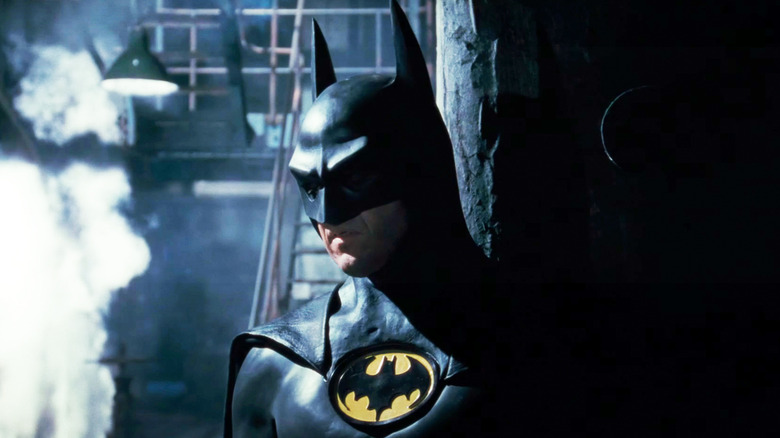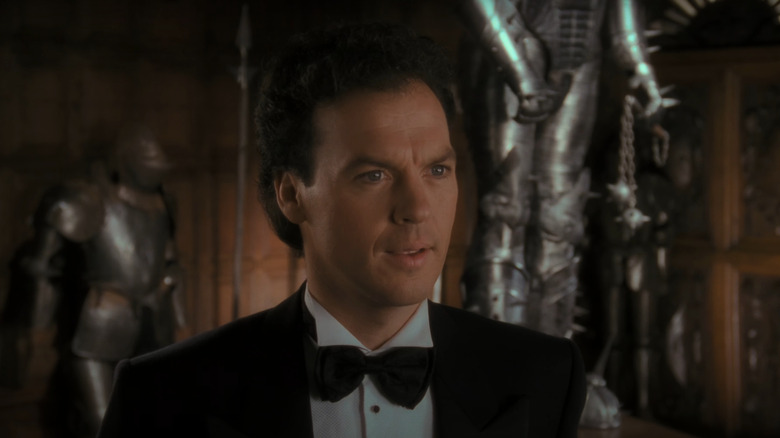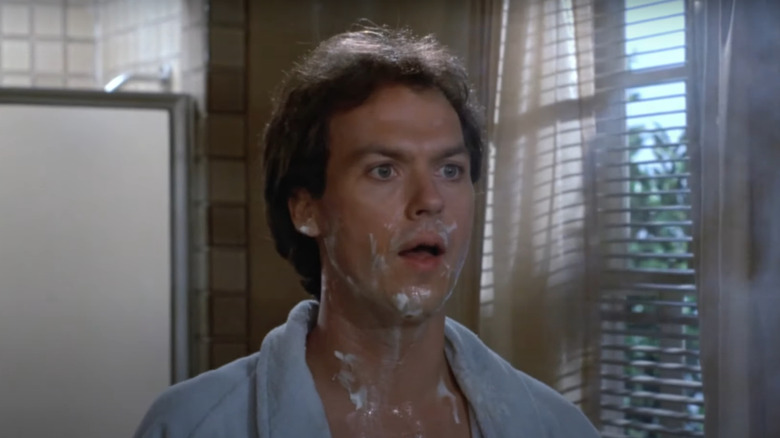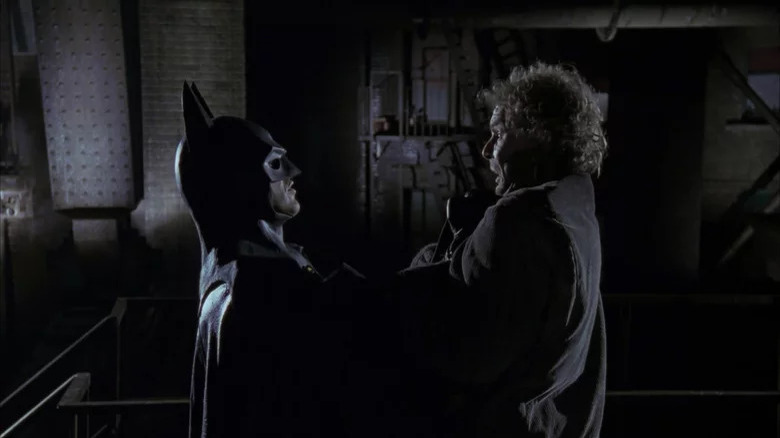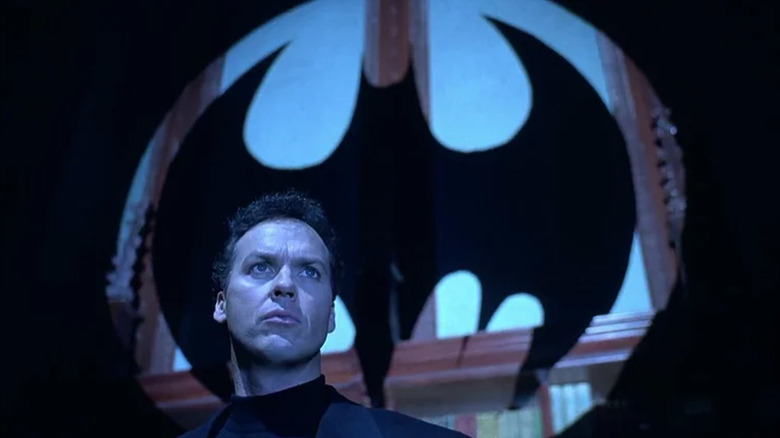How Tim Burton Convinced Batman's Producer To Cast Michael Keaton
Decades before internet dwellers decried Robert Pattinson earning the lead role in Matt Reeves' "The Batman," there was the original Batman casting controversy. When Michael Keaton was confirmed for 1989's "Batman," the backlash was significant enough that director Tim Burton had to fight to keep his star. But as with most casting debacles, it turned out to be for nothing. Not only had Keaton figured out Batman's real power lay within Bruce Wayne, the actor was in perfect alignment with Burton's vision for a shadowy, expressionistic reinvention of Batman for a new generation. Which, as it happens, lined up with what producer Michael E. Uslan had envisioned when he set "Batman" 1989 in motion.
The lawyer-turned-producer had acquired the rights to a Batman movie in the '70s, and was intent upon seeing his dream of a truly dark onscreen Dark Knight come to fruition. As Uslan put it, the goal was to show general audiences more familiar with the '60s TV show that there was "more to Batman than pow, zap, and wham." And who better to realize that creative vision than Tim Burton, whose affinity for laconic loner characters and subversive visual styles fit perfectly with Uslan's ambitions?
But while the two seemingly shared a singular vision for a broody Batman, you might be able to imagine how Uslan felt when he learned his director wanted to cast the star of '80s comedies such as "Mr. Mom" and "Night Shift" in the lead.
'I carried on like a baby'
Michael Keaton was not known as a serious actor when Tim Burton and executive producer Michael E. Uslan were casting "Batman" '89. Keaton's drama "Clean and Sober," in which he played a substance-addicted realtor, had not yet been released, and the actor was, at that stage, essentially a Jim Carrey type — someone who had parlayed his talent for physical comedy and stand-up experience into a movie career that had consisted mostly of lighthearted family fare.
Naturally, Uslan didn't initially think Keaton was the man to play a tortured figure of the shadows in "Batman." In fact, the producer was all but convinced that Burton had lost his mind when he first found out. In his memoir, "The Boy Who Loved Batman," Uslan recalled how, in a foreshadowing of a famous scene from the movie itself, he "went nuts" upon hearing his director's choice for the lead role, adding, "I yelled. I screamed. I carried on like a baby. I argued. I protested. I fought. I reasoned. I swore. I begged. I pleaded. I countered. I discussed. I debated. I called in allies from DC Comics."
At that point, Uslan tried to mount his own mini backlash at Keaton's casting, entirely convinced that his dream of reinventing Batman was slipping away from him. But, as the producer wrote, "Missing from my gut fanboy reaction was accounting for the genius that is Tim Burton."
An action movie without an action star
Tim Burton was never going to go the conventional route when it came to making his Batman movie, and that was basically the whole point. There had been nothing conventional about this project since Uslan kicked the whole thing off by rallying for a darker cinematic interpretation of the character. So it was with casting where Burton, as he explained in the book "Burton on Burton," couldn't help but go against the idea that an action blockbuster required an action star: "I saw a zillion people and the thing that kept going through my mind when I saw these action-adventure hero types come into the office was, 'I just can't see them putting on a Bat-suit. I can't see it.'"
What he could see, however, was someone like Michael Keaton having to don an imposing, theatrical outfit in order to project the kind of physicality required of a lone vigilante stalking the Gotham nights. Unfortunately, in an apparent deviation from their shared sensibilities, that vision didn't quite click with Uslan — at least not at first. But as the producer wrote in his memoir, his director had anticipated pretty much every objection, providing responses to Uslan's misgivings that were "a revelation."
The revelations
In "The Boy Who Loved Batman," Uslan lays out an exhaustive list of his concerns about casting Keaton as Batman, along with every single pre-prepared response from Burton. In reply to the main concern that "Michael Keaton is a comedian," and "not a serious actor capable of being a serious Batman," Burton simply argued the contrary, even setting up a screening of "Clean and Sober" so that Uslan could witness the star's dramatic chops firsthand.
Next up was the "problem" of the 5-foot 9-inch Keaton's stature and physicality, which Burton evidently "knew how to cheat" during filming and which would be enhanced by musculature that was "carved into the costume." But you can't necessarily cheat the fact that, as Uslan put it, "Keaton doesn't have a square jaw like Batman does." Fortunately, for Burton, that simply wasn't the problem his producer thought it was, and the response came tersely: "Michael, a square jaw does NOT a Batman make."
That last point was essentially a way of highlighting that, in his trenchant opposition to casting Keaton as Batman, Uslan had strayed from his guiding principle of making something unconventional — of reinventing Batman. Thankfully, Burton's confident responses eventually won over the producer, who summed it up like this:
"[Burton] knew that with Michael Keaton, he could paint a picture of a Bruce Wayne so driven to the breaking point that audiences would say, 'THAT'S a guy who would put on a Bat-Suit to fight crime!' And that alone sums up the genius of Tim Burton."
Keaton's casting could have been a Jack Reacher debacle
While Uslan had the initial idea, there were so many crucial elements that Burton brought to "Batman," and one of the most important was undoubtedly casting Keaton as the greatest on-screen Batman of all time. And it's worth noting just how intelligent and prescient a choice that was.
The initial backlash to Keaton's casting could have easily become a Jack Reacher situation. When Tom Cruise was cast as the lead in the 2012 big screen adaptation of Lee Child's best-selling book series, fans were outraged that the 5-foot 7-inch star was playing what was supposed to be a 6-foot 5-inch, 250-pound ex-Army man. And that outrage never really faded, ultimately prompting Child to take his character and reinvent him for the streaming age by casting the comparatively bulky Alan Ritchson in Amazon's streaming adaptation, "Reacher."
That could have very well been the case with "Batman." There was nothing to suggest that offended fans would forgive Burton and the producers for casting Mr. Mom as the Dark Knight. But they very quickly did, and Burton's vision of a Bruce Wayne that relied on the Bat-suit to become a creature of the night worked. Could Burton have known that was going to be the outcome? Of course not. But he followed his intuition and it all came together. Luckily, his powers of persuasion were as strong as his artistic sense, otherwise perhaps Uslan would have scrapped the idea before Keaton was even allowed a screen test.
